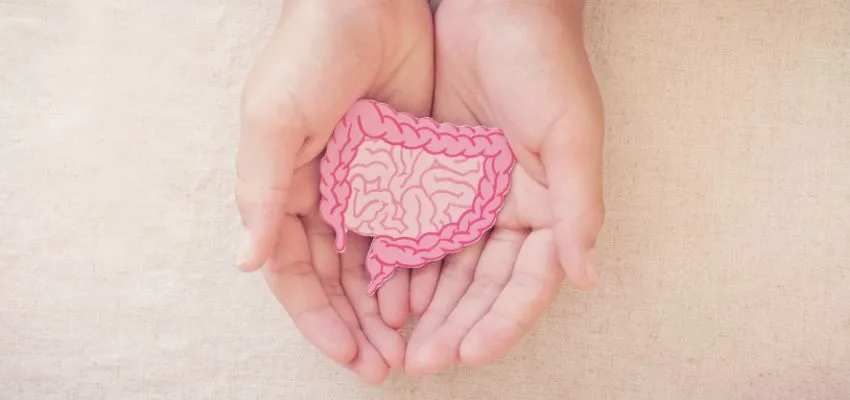
Self-hypnosis for Sleep: More Relaxation and Better Nights

What is the National Guild of Hypnotists Certification?
Irritable Bowel Syndrome (also known as IBS) is a condition where people suffer from chronic abdominal pain, bloating and changes in bowel habits. This chronic disorder affects about 11% of the population worldwide and is more common in women than in men. In addition, irritable bowel syndrome is often paired with anxiety disorders such as panic disorder and can profoundly affect the quality of life.
The gut-brain connection is a complex phenomenon that researchers have only recently recognized; however, the relationship between the two is now well established.
The link between IBS and anxiety is believed to be two-fold: not only can IBS symptoms trigger anxiety, but intense stress can also make IBS symptoms worse.
This article will discuss the gut-brain axis, the IBS subtypes, anxiety disorders and treatment options, including gut-directed hypnotherapy.
What is the Gut-Brain Axis?
The gut-brain axis defines the complex connection between our gut and our brain. The two are in constant communication, as messages sent from the gut to the brain can affect emotions, behaviour, and overall mood. This interaction is bidirectional; anxiety or chronic stress can lead to IBS symptoms, while irritable bowel syndrome symptoms can also contribute to anxiety and depression.
The central nervous system influences the digestive system, while the enteric nervous system (ENS), located within the gut wall, also regulates digestion. The ENS is sometimes referred to as “the brain in your gut,” and its job is to control the motor functions of the digestive system. Therefore, when we experience stress or anxiety, it can result in physical changes in the digestive and immune systems too.
The sympathetic nervous system is particularly influential in this process. It is responsible for activating the body’s “fight or flight” response, and it can cause a decrease in digestive activity when activated due to anxiety or stress.
Finally, the vagus nerve is the main pathway for communication between the gastrointestinal system of the gut and the brain. Research has shown that gut inflammation (the upset stomach) can directly impact this connection.
Hypnotherapy in Hong Kong Can Help to Relieve Insomnia
Anyone who has chronic insomnia knows that it is much more than the occasional ability to fall […]
Symptoms of Irritable Bowel Syndrome and Panic disorder
IBS Symptoms
Symptoms of IBS can include abdominal pain, cramping, constipation, diarrhoea, bloating, and gas. A person suffering from IBS might withdraw from social activities and avoid certain foods that trigger symptoms. A fully regimented life can begin to feel like the norm and ultimately lead to feelings of fatigue, depression, and irritability. For people seeking a partner, such symptoms can make dating problematic and enhance feelings of helplessness.
Panic Disorder Symptoms
On the other hand, panic disorder is characterized by recurrent episodes of intense fear or dread that cause physical symptoms such as trembling or shaking, dizziness, heart palpitations, sweating, shortness of breath, trouble breathing, feeling like one is choking or going crazy, nausea and abdominal and chest pain. In addition, panic disorder can encourage avoidance behaviours, which can significantly impact one’s quality of life by interfering with daily activities.
The frequency of panic attacks varies from person to person and can range from occasional attacks to daily or weekly episodes.
What Causes IBS?
The exact cause of irritable bowel syndrome is unknown, but several factors may contribute to its development. These include genetic predisposition, stress, diet and lifestyle choices, overactive or underactive digestive muscles, imbalances in the gut microbiome (the population of bacteria living in the gastrointestinal tract), and low serotonin levels.
Moreover, while the cause of IBS remains unknown, research has found a strong link between this disorder and anxiety and mental disorders. Up to 70% of people with IBS also suffer from an anxiety or panic disorder.
Why IBS Worsens Anxiety Disorders
The exact cause of irritable bowel syndrome is still unknown, but we can easily guess how IBS can create challenging situations. People who suffer from IBS report being afraid of not trusting their bodies. As a result, they tend to shun social activities or are often scanning the environment for a restroom in case of an emergency. Even a car ride can become very stressful. They might often feel on alert, which can make their anxiety worse.
Self-Hypnosis vs. Hypnotherapy: Which is the Best?
Since the 18th century, medical professionals have used hypnosis to treat a variety of patients. It has […]
Prevalence of Anxiety and Depression Comorbidities
Anxiety and depression are the most common psychological disorders in patients with IBS. Studies have reported some anxiety in up to 80% of irritable bowel syndromes and depression in 30–50% of IBS patients.
Anxiety and Depression and IBS Subtypes
Evidence suggests that people with IBS and a higher degree of anxiety or depression have more severe symptoms than those with IBS but no mental health issues. There are three subtypes of irritable bowel syndrome.
- diarrhoea-predominant type (IBS-D)
- constipation-predominant irritable bowel syndrome (IBS-C)
- alternating irritable bowel syndrome (IBS-A)
Those with the diarrhoea-predominant type (IBS-D) are more likely to have anxiety and depression. At the same time, those with constipation-predominant irritable bowel syndrome (IBS-C) or alternating irritable bowel syndrome (IBS-A) are less likely to suffer from an anxiety disorder.
Treatment Options for IBS and Panic Disorder
Treatments for IBS and anxiety include both medications and psychotherapy. Doctors may prescribe antidepressants, anti-anxiety medications, or drugs to reduce IBS symptoms. Psychotherapy will target anxiety and teach people how to cope with their elevated stress and anxious thoughts. In addition, both doctors and therapists will encourage lifestyle changes such as stress management, a healthy diet, and regular exercise to decrease IBS symptoms.

The Rise of Gut-Directed Therapies
Gut-directed therapies, such as hypnotherapy and cognitive behavioural therapy (CBT), are becoming increasingly popular for people with IBS. CBT can help patients change their thought patterns to reduce anxiety levels, while hypnotherapy helps them relax, overcome anxiety, and control the physical symptoms associated with IBS.
Hypnotherapy for IBS
Drug-free treatment for both IBS and anxiety is hypnotherapy. This therapy uses relaxation techniques to encourage people to focus their attention on positive thoughts and emotions. A hypnotherapist will lead the patient through relaxation exercises, visualization, and other mental exercises designed to reduce stress levels and the severity and intensity of IBS symptoms. In addition, hypnosis sessions can help overcome inaccurate beliefs and reframe the perceived threat.
According to studies conducted in the US and Asia, hypnotherapy can effectively reduce IBS symptoms, improve anxiety levels, and enhance the overall quality of life. One of the studies even followed patients six years later and found that many had sustained the improvements.
Cognitive Behavioural Therapy
In addition to hypnotherapy, cognitive behavioural therapy can also help people with IBS and anxiety. CBT is a type of psychotherapy that focuses on identifying and changing negative thought patterns and behaviours. This therapy aims to help individuals develop coping strategies for dealing with their symptoms, learn to manage stress better and find relief from their symptoms.
Acceptance and Commitment Therapy: A Comprehensive Guide
If you tend to label uncomfortable emotions such as stress or anger as bad and avoid them […]
Stress Reduction with Yoga, Deep Breathing & Meditation
Finally, many people with irritable bowel syndrome and anxiety have found yoga, meditation, deep breathing and other relaxation techniques beneficial in managing their symptoms. These approaches can help reduce stress levels, improve sleep quality and digestion, increase physical activity levels, and improve overall well-being.
Mindfulness-based stress reduction can also release stress and hence reduce psychological distress.
Relieve Anxiety with IBS Support Group
Overcoming irritable bowel syndrome can feel like a daunting task. However, joining an irritable bowel syndrome support group can be immensely helpful. Connecting with other people in similar situations can provide a sense of understanding and companionship. This type of community can also offer treatment feedback, help reduce feelings of isolation, and provide necessary emotional support when needed the most.
Medication for IBS Patients
In addition to lifestyle modifications, some people with both IBS and anxiety may need medications. Antidepressants like selective serotonin reuptake inhibitors are commonly prescribed as they can help reduce IBS symptoms such as abdominal pain, bloating, and diarrhoea. A doctor may also add anti-anxiety medications to the prescription list if the individual is experiencing panic attacks or other anxiety symptoms.
Learn More About Hypnotherapy to Rewire the Brain in Hong Kong
People from all over the world are continuing to discover the benefits that hypnosis offers. This system […]
The Role of Hypnotherapy in Treating Irritable Bowel Syndrome and Anxiety
The use of hypnosis to treat the body is not a new concept. The National Institute of Health (NIH) highlighted the need for behavioural therapy, especially hypnotherapy, to help patients manage pain and insomnia. In 1995, 23 experts in pain medicine, sleep medicine, psychiatry, behavioral medicine, psychology, and neurology found strong evidence that hypnosis could alleviate pain, hence encouraging the development of holistic medicine and complementary practices like hypnosis.
Hypnotherapy is a powerful tool for treating both IBS and anxiety. It can help people learn to relax and control the physical symptoms associated with IBS, as well as reduce stress levels, improve sleep quality, manage their thought patterns and behaviours, and ultimately lead to improved overall health.
A study published in the Lancet in 1994 found a dramatic improvement in IBS symptoms in the group who received hypnotherapy while the group who received psychotherapy showed a slight improvement in some symptoms. More interestingly, at the 3-month follow-up, the hypnotherapy group maintained the accrued benefits.
Irritable bowel syndrome and anxiety can profoundly affect one’s quality of life. Still, with the right combination of treatments, people can control IBS symptoms flare-up and enjoy better health. If you or someone you know is experiencing IBS and/or anxiety, it is important to seek out professional help from a medical doctor and a hypnotherapist as soon as possible.
Other Functional Gastrointestinal Disorders
IBS is one of the most common gastrointestinal issues, but it is not the only one. Other gastrointestinal disorders are functional dyspepsia and inflammatory bowel disease. Functional dyspepsia is characterized by early satiety, bloating, and pain in the upper abdomen. An inflammatory bowel disease (IBD) is an autoimmune disorder that causes inflammation in the digestive tract.
As for IBS, the treatments for both conditions include lifestyle modification, dietary changes, and medications. Similarly, a hypnosis treatment can make lifestyle changes more manageable, while nutrition advice can help you identify the necessary dietary changes.
Hypnosis for Pain Relief: Managing your Brain To let Go of the Pain
When we think of pain, we often think of acute pain, such as the pain of a […]
The Need for a Multimodal Approach to Treatment
IBS and anxiety are inextricably linked, and the complex relationship between them must be understood to provide effective treatments. Understanding how IBS, panic disorder, and depression interact can help healthcare professionals better manage these conditions.
The brain-gut axis is an important biological pathway that links IBS and anxiety, and understanding this connection is essential for designing appropriate therapeutic strategies.
Therapies such as hypnotherapy first and then CBT can target the psychological aspects of IBS and panic disorder, while medications, dietary changes and lifestyle modifications can help reduce GI symptoms.
Ultimately, a multimodal approach is needed to treat these conditions optimally. Hopefully, with the knowledge of this connection and a wide choice of treatment options, more people can successfully manage their irritable bowel syndrome and anxiety disorders.
















